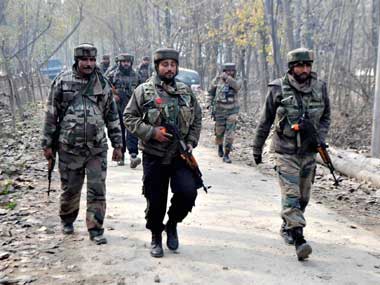Seven Army men, including two officers, have been sentenced for life by a special Army court for the staged and fake Machil encounter in Kashmir. The sentence comes after two young men were killed by the army for no reason a week or so ago. On the face of it, it would appear, that the sentence is in the nature of a PR exercise. Two young men were killed by the Army. This was followed by an accident involving the CRPF in which two locals were killed. It may be adduced from this that the Army may be wanting to pre-empt a repeat of 2010 where pent up anger and bottled up collective rage led to mass protests against the state. This led to the killings of 100 young men. The question is will the sentencing of the seven army men cut ice with the people of Kashmir? Will it reduce deep alienation among Kashmiris?[caption id=“attachment_1804493” align=“alignleft” width=“380”]  Army personnel move to take positions during an encounter with LeT militants in Kulgam District of South Kashmir on Friday. PTI [/caption] Unlikely. The deep alienation that exists among Kashmiris accrues from historical reasons and a clumsy ham fisted approach to deal with it. This has bred and fostered cynicism among the masses and the army sentencing, stripped of accretions and rhetoric, is merely symbolic. The problem in Kashmir is deep and profound and the cynicism it has bred even profounder. Symbolism is likely to make this cynicism deeper. In the worldview of those who have chosen to carry out the sentences now, the premises and the operating assumptions may be that given the Chattergam incident is fresh (two young men were shot dead while they crossed an army checkpost), the sentencing would win accolades from Kashmiris. This erroneous assumption, in mistaking symptoms for causes and is in the nature of putting the cart before the horse. Settling Kashmir and thwarting alienation here calls for a clear cut causal analysis (teasing out cause and effect) and then an honest appraisal by powers that be in the Indian political firmament and security establishment. The problem is political and a solution has got to be political as well. The major assumption and approach towards Kashmir, historically and even contemporarily, has been, to use a rather voguish term, has been ‘outsourcing’ Kashmir to the security establishment. This outsourcing has denigrated or made subservient the political aspect of the problem. The elevation of the security paradigm has ironically and paradoxically led to the creation of insecurity through too much security in Kashmir. The enactment of laws, like the Armed Forces Special Powers Act (AFSPA), for instance, are a classic example of this. By empowering security forces without any hedges and meaningful restraints on the use of lethal force, a veritable monster is created. The Machil fake encounter, the Pathribal case and now the Chhatergam killings correspond to a pattern: the use of unrestrained lethal force that is open to misuse and abuse. The consequences of these are cumulative adding up to the complex layers of disaffection, discontent and alienation in Kashmir. Too much security, to repeat, leads to, insecurity which leads to disaffection and alienation. The causal chain and sequence is clear cut but yet powers that be refuse to see this and operate in denial. What could be the ‘solution’? There are no customized solutions to the problems posed by the paradox of insecurity accruing from too much security. However, tentatively, a part answer may lie in the domain of the political. The Kashmir ‘problem’ is political and the answer lies in crafting a political solution to it. Or, in other words, the elevation of the political over the narrow prism of security. What would this mean in practice. A first step would be revocation of the draconian AFSPA - an Act which has now become anti-people. This could be in the nature of a confidence building approach with Kashmiris. This could be followed by forging a win win solution with all stakeholders to the conflict over Kashmir. The conflict is multi-dimensional but yet interrelated: there is the conflict in Kashmir and there is the conflict over Kashmir. The stakeholders to this conflict matrix are obvious. All the stakeholders need to be on the same page regarding the resolution of this vexed and vexatious dispute. The operating premise here should be peace within and without and a life of dignity, honour and security for Kashmiris. Kashmir and Kashmiris have witnessed and experienced death, misery and depredations because the conflict has festered for far too long. It behoves powers that be that have a stake in Kashmir to take a far sighted and statemanly approach to the conflict and grasp the nettles. Machil, Pathribal and the 2010 protests cost lives-precious ones that cannot be brought back. This calls for prudent and sober action. The nature and trajectory of history can be brutal. We don’t have to wait for a Holocaust to concentrate minds. The time for substantive and meaningful action is now. Our worlds will be better for it.
The deep alienation that exists among Kashmiris accrues from historical reasons and a clumsy ham fisted approach to deal with it.
Advertisement
End of Article


)

)
)
)
)
)
)
)
)



